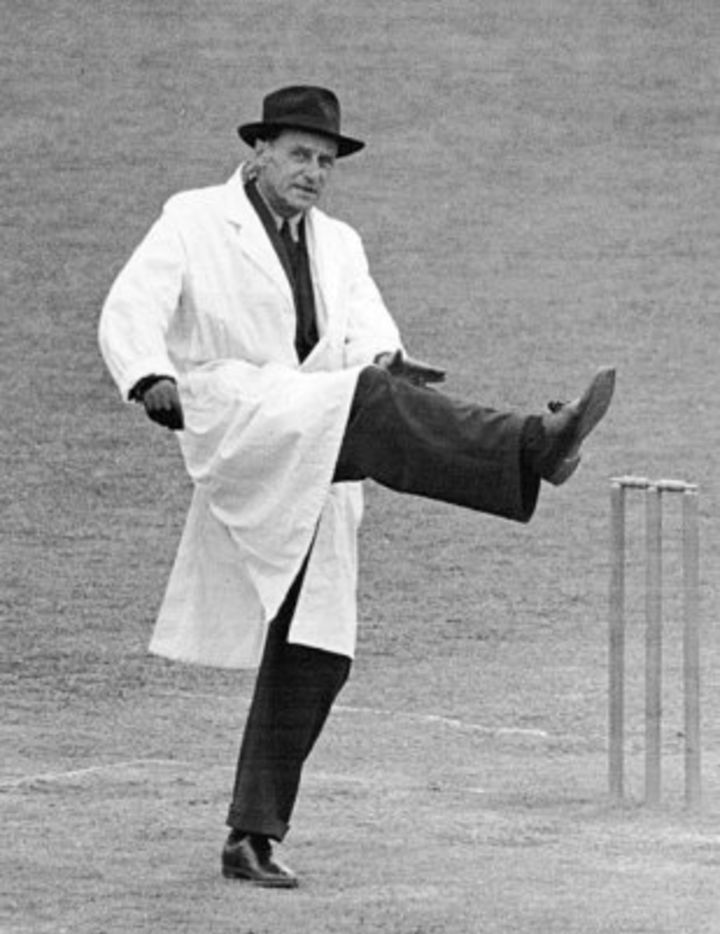Talking DRS with the ghost of Frank Chester
In which a long-deceased umpire weighs in on the review system

England and Sri Lanka will do cricketing battle with (a) each other and (b) another unpromising weather forecast in the final Test at Southampton today. It is the Rose Bowl’s first Test match. As the old joke goes, new Test grounds in England are like London buses – you wait 100 years for one to turn up, and then three come along in under a decade.
Thus far, excluding the final-afternoon mayhem in Cardiff, when England’s bowlers obliterated their opponents like a hungry rhinoceros turning up at a somnolent picnic just as granny was packing away the remnants of a half-eaten pavlova, it has been a middling series. England’s imposing batting has only briefly been inconvenienced by Sri Lanka’s rather blunt and inexperienced bowlers, and there has been a degree of tactical caution by both sides that has further bunged up the already-rain-stifled cricket.
From England’s point-of-view, the series has further illustrated how crucial James Anderson has become to a seam attack that looked both one-paced and one-heighted at Lord’s. After averaging under 33 in just two of his previous 11 Test series (early-summer series against New Zealand and West Indies), the Lancastrian is now one good match away from his fourth consecutive series average of 26 or less. From the early days of his international career it was clear that Anderson could, in bowling parlance, “make the ball talk”. Unfortunately what he made the ball say was not always “Look out, batsman, I’m an unplayable outswinger”; slightly too often it was, “Ouch, I’ve been smashed for four again”.
As many of his team-mates have done, he has improved markedly with experience and, in an age of dominant batting and often pallid pace bowling, is now one of the most exciting players to watch in world cricket today.
Meanwhile there has been little talk in my house of anything other than India’s refusal to use the Decision Review System – easily my favourite decision review system – in the Test series in England later this summer.
The Confectionery Stall decided to consult one of the world’s leading umpires in order to acquire the officials’ view on this contentious matter. Unfortunately a stroll to and from my local station had resulted in no chance meetings with umpires from the ICC Elite Panel, and a telephone call to a confused Steve Bucknor resulted in the Jamaican Justice Dispenser informing me that he was being chased by a giant fire-breathing Allan Border, claiming that he had got an inside edge on that apparently plumb lbw appeal, whilst a fire-breathing dragon with Darrell Hair’s face was barking “that’s not out” in inflammatory morse code (a salutary lesson never to call a former Test umpire at 4.30am, particularly not after he has hosted a late-night cheese-tasting competition).
Therefore I was left with little option but to hire an ICC-ratified medium to make contact with the ghost of the legendary Frank Chester, who stood in a then-record 48 Tests from 1924 to 1955. After some small ice-breaking small-talk, in which Chester admitted that if he had had access to Hawk-Eye in the inter-war years, he would definitely have given Don Bradman out more often, just to see the look on Bradman’s face, he said that he is largely in favour of the DRS, but suggested some modifications to make it more spectator-friendly.
“There is much that I like about it,” commented the spirit of perhaps the greatest umpire of all time. “In particular, it provides the umpire with the opportunity to look triumphantly smug when his decision is upheld by technology. I would, however, suggest that a new signal for ‘that’s still out’ should be introduced, for when a batsman wrongly refers a decision. The umpire should raise the index finger in the traditional manner, but then add his middle finger and send the batsman on his way with a salute as old as time itself.”
Chester continued: “Imagine the atmosphere in a dressing room after a batsman who had clearly edged a ball then pointlessly referred it anyway. Development required: Dressing-room cameras and microphones to enable the viewer to see and hear the dismissed batsman claim, ‘I didn’t call for the referral. I was just asking for someone in the dressing room to make me a cup of tea.’”
Chester also observed that “boring batsmen always seem to be the ones to be reprieved”, and proposed that “a degree of democratic flexibility needs to be introduced to factor in whether a majority of the crowd wants to continue watching the appealed-against player bat”. He ruminated: “Perhaps Hawk-Eye could assume that the stumps are, say, 50% bigger when someone like Chris Tavare is batting.”
Chester concluded by expressing concerns that any system of appealing against a judicial decision inevitably leads to legal complications. “You wait,” he muttered ghostlily. “Lawyers are like Jonathan Trott. Once they get in, they are almost impossible to get out. Mark my words, within 10 years, most lbw decisions will be dragged through the courts like an American murder trial. It will take between five and 10 years to find out whether or not a batsman is out. And that is not going to help with over rates that are already so slow that if I had simply woken up from my 1957 death and looked at a scorecard of a complete day’s Test cricket, I would have assumed that a volcano had erupted at the tea interval and ended the day’s proceedings.”
The ghost of Frank Chester then thanked me for getting in touch, and said that he had to leave to umpire a Bodyline rematch.
Andy Zaltzman is a stand-up comedian, a regular on the BBC Radio 4, and a writer
Read in App
Elevate your reading experience on ESPNcricinfo App.